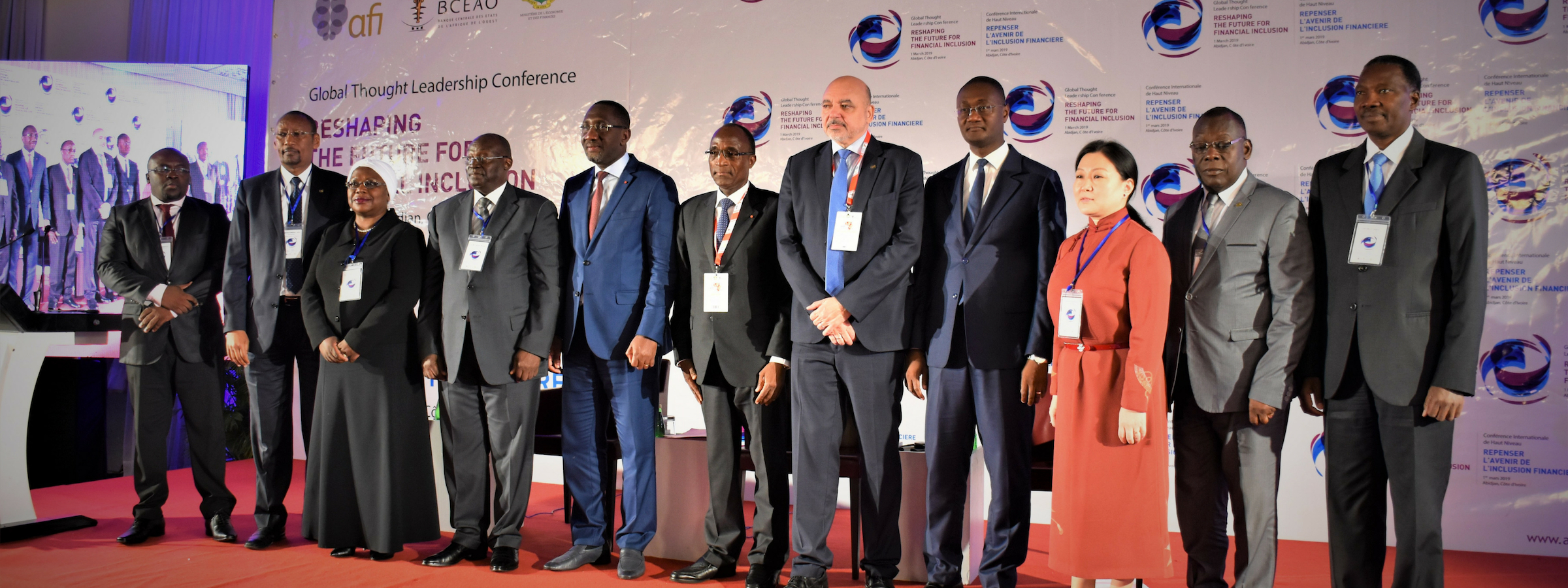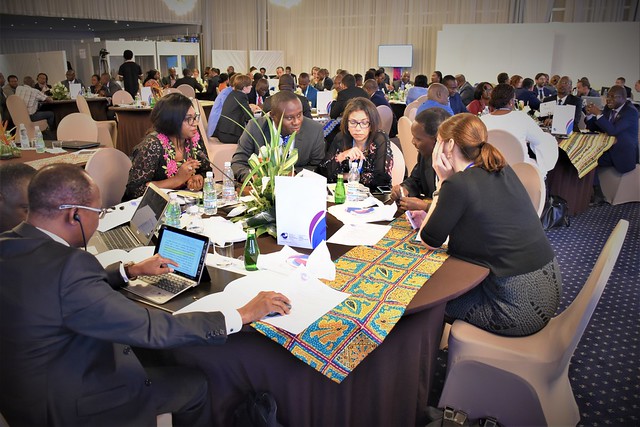First of its kind, high-level policy conference focusing on the future of financial inclusion and most effective policies that can reach the remaining 1.7 billion unbanked adults globally is being held in Abidjan, Cote d’Ivoire on Friday, 1 March 2019.
Co-hosted by the Central Bank of West African States (BCEAO), Ministry of Economy and Finance of Cote D’Ivoire and Alliance for Financial Inclusion (AFI), the global thought leadership conference is attended by over 180 leaders who are deliberating solutions to reach the full financial inclusion.
With 2030 as the milestone for achieving the Sustainable Development Goals (SDGs), global issues and challenges require global solutions and responses. With access and usage of quality financial services as main enablers in reaching the SDGs, the conference is an opportunity to discuss breakthrough solutions.
“If we are to continue to maintain momentum in reducing the 1.7 billion unbanked, today we should focus on which policies are most effective to reach the remaining unbanked adults,” AFI Executive Director Dr. Alfred Hannig said in his opening comments adding the need for effective partnerships in order to reach that goal.
“The global challenges we are seeing, from the impacts of climate change, to the refugee crisis, to the need for coordinated application of global financial standards, require global responses and cannot be dealt with by individual countries in isolation,” Dr. Hannig underlined.
Access to financial services is the basic right of every citizen, just like health and education, BCEAO Governor Kone Tiemoko Meyliet highlighted in his opening remarks. Financial inclusion strategies are a response to challenges faced by the vulnerable in our countries especially for those in rural settings, the youth and women, he said.
Financial inclusion is a powerful catalyst for development, fostering participation of the vulnerable in society and improving the welfare of the country.
“There is a close relationship between economic growth, financial inclusion and sustainability. Financial inclusion strengthens the economy, increases the income of economic agents, allocation of funds to health and education and tackles inequalities. Financial inclusion is at the core of all development policies aimed at fostering growth, fighting poverty and social inequalities,” Governor Kone emphasized.
The Central Banks have the daunting tasks to find avenues to foster financial inclusion while safeguarding and ensuring stability of the financial sector, he said.
In spite of gains, challenges remain such as increasing consumers’ financial education which should ensure they are safeguarded against misuses, Governor noted and underlined that the conference is an opportunity “to identify pragmatic and tangible solutions and go an extra mile for the financial inclusion of our population.”
Minister of Economy and Finance Adama Kone of Cote D’Ivoire told the global thought leaders that even though the indicators on the access to financial services in the region are positive, the region is still behind compared to the average at the international level.
Only 35 percent of adults in Africa and 21 percent in the Middle East have an account, according to the Global Findex. Authorities of the Western African States have initiated actions in promoting financial inclusion aimed at youth, women and those living in rural areas.
“Cote D’Ivoire adopted National Financial Inclusion Strategy that is embedded in the country’s National Development Plan aimed at reducing poverty, stimulating growth and tackling inequalities,” he said.
“This meeting is an opportunity for developing a collective vision for financial inclusion and relevant recommendations that should foster regulatory framework to allow us to reach full financial inclusion,” Minister Kone underlined.
Global Thought Leadership Conference on “Reshaping the Future for Financial Inclusion” is addressing:
- Which policies are most effective to reach the remaining 1.7 billion unbanked adults and achieve full financial inclusion?
- What is needed to close the persistent 9 per cent gender gap in financial inclusion across developing & emerging countries?
- How should policymakers realize the potential of innovative technology to achieve full financial inclusion, whilst safeguarding against risks?
About BCEAO
An active member of the AFI network since January 2011, Banque Centrale des Etats de l’Afrique de l’Ouest (BCEAO), is a central bank serving eight West African countries, comprising of the West African Economic and Monetary Union including Benin, Burkina Faso, Cote d’Ivoire, Guinea Bissau, Mali, Niger, Senegal and Togo. As part of their Maya Declaration target, BCEAO is committed to increasing the financial access rate to 75 percent of the population by 2020.
About Ministry of the Economy and Finance of Cote D’Ivoire
Since becoming an AFI member in August 2009, the Ministry of Economy and Finance of Cote D’Ivoire has been instrumental in scaling up financial inclusion efforts in the country. The ministry is committed to the Maya Declaration with ongoing targets on core financial inclusion areas such as establishing a framework for analyzing progress indicators, strengthening consumer protection and empowerment, and implementing the microfinance restructuring plan in Cote D’Ivoire.
Photo gallery
Move your mouse over the photo and click the arrows pointing left/right to flip through photos in the gallery.


